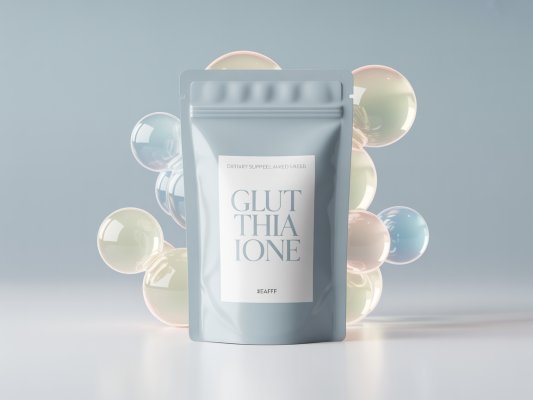
Glutathione
Description
Glutathione is a naturally occurring antioxidant found in every cell of the body. It is composed of three amino acids: glutamine, glycine, and cysteine, and plays a critical role in protecting cells from damage. This article provides a comprehensive yet easy-to-understand guide to Glutathione, its benefits, and how it works.
Quick Overview: Glutathione At-a-Glance
- Key Benefits: Powerful antioxidant, detoxification support.
- Primary Mechanism: Neutralizes free radicals, supports liver function.
- Best For: Supporting overall health, detoxification, and antioxidant defense.
- Typical Dose Range: 250-2000mg daily (oral), varies by form.
- Key Caution/Consideration: Oral absorption is debated; may lower zinc levels with long-term use.
Table of Contents
Categories & Effectiveness
Learn about our rating methodologyBrain Health
Brain Antioxidant Shield
7/10Strong evidence of effectiveness
Excitotoxicity Defense
2/10Limited evidence of effectiveness
Systemic Health
Detoxification Aid
9/10Strong evidence of effectiveness
Systemic Antioxidant
7/10Strong evidence of effectiveness
Anti-Inflammatory (Systemic)
2/10Limited evidence of effectiveness
Dosage & Side Effects
Recommended Dosage
Key Dosage Tips:
- Consult a healthcare professional for personalized advice.
- Start with a lower dose and gradually increase as tolerated.
- Consider liposomal or sublingual forms for potentially better absorption.
Potential Side Effects
Use cautiously if:
- You have asthma.
- You are pregnant or breastfeeding.
Bioavailability & Half-Life
Interactions & Stacks
Recommended Products
Naturkur® L-Glutathion 500 mg - 120 Kapseln im Apothekerglas - Vegan, reduziert & bioaktiv, ohne Zusatzstoffe, in Handarbeit hergestellt in Unterfranken
- Rated 4.6 stars by 156 customers
- Premium quality ingredients
Liposomales Glutathion Weichkapseln, hochwirksames Glutathion-Ergänzungsmittel 1000mg pro Portion, 60 Kapseln
- Rated 4.4 stars by 174 customers
- Special offer: Spare 10 % mit Rabattgutschein
Liposomales Glutathion 1500 mg, glutathion-Flüssigkeit mit Vitamin C, L-Glutathion reduziert (GSH), Vegan, Flüssig 120 ml
- Rated 4.4 stars by 355 customers
- Premium quality ingredients
As an Amazon Associate we earn from qualifying purchases. Prices and availability are accurate as of the date/time indicated and are subject to change.
Benefits by Use Case
Antioxidant Support
Neutralizes free radicals, protecting cells from oxidative damage. Essential for overall health and disease prevention.
Detoxification
Aids in the detoxification of chemicals in the body and liver. Supports liver health and function.
mild cognitive impairment
Patients with MCI had significantly elevated ratios of glutathione in the anterior and posterior cingulate compared to controls. Higher anterior cingulate glutathione related to decrements in executive functions, while elevated posterior cingulate glutathione was associated with poorer memory consolidation.
Immune Support
Boosts weakened immune systems by supporting the function of immune cells. Helps the body fight off infections and illnesses.
Mechanism of Action
Frequently Asked Questions
Where to Buy Glutathione
Based on quality, price, and customer reviews, here are our top recommended Glutathione supplements:
L-GLUTATHION reduziert zu 98% | Optimale Formel mit Vorläufern + Vitamin C | Tripeptid: Glutaminsäure, Cystein, Glycin | 90 Kapseln Vegan Hochdosiert
- Rated 4.2 stars by 1,079 customers
- Premium quality ingredients
Fair & Pure® - L-Glutathion 250mg - 60 Kapseln - vegan - reduziert - Antioxidans - ohne Magnesiumstearat
- Rated 4.2 stars by 723 customers
- Premium quality ingredients
L-Glutathion Kapseln - 100 Tagesvorrat - Ausgewogene Dosis - Hoher Bioverfügbarkeit - Ohne Zusatzstoffe - Deutsche Produktion
- Rated 4.4 stars by 536 customers
- Special offer: 12 % Rabatt auf deine erste Abonnement-Bestellung
As an Amazon Associate we earn from qualifying purchases. Prices and availability are accurate as of the date/time indicated and are subject to change.
Summary & Expert Opinion
- Key Strengths: Potent antioxidant, supports detoxification processes.
- Key Weaknesses: Oral bioavailability is debated, potential for gastrointestinal side effects.
- Recommendation: Consider liposomal or sublingual forms for potentially better absorption. Consult a healthcare professional before starting supplementation, especially if you have underlying health conditions or are taking medications.
For those seeking a deeper understanding, the mechanism of action of Glutathione involves complex interactions with various enzyme systems and regulatory pathways. Glutathione directly neutralizes ROS, preventing oxidative damage to cellular components. It also acts as a cofactor for several enzymes involved in detoxification, such as glutathione S-transferases (GSTs). These enzymes catalyze the conjugation of Glutathione to various toxins, making them more water-soluble and easier to excrete from the body.
The study by Aoyama (2021) highlights the importance of Glutathione in the brain, noting that healthy human brain Glutathione concentration is approximately 1-2 mM, varying by brain region, with evidence of gender differences. This underscores the potential neuroprotective role of Glutathione, although more research is needed to fully elucidate its effects on cognitive function and neurodegenerative diseases.
The review by Kobylarz (2023) provides detailed dosage recommendations for numerous antidotes, including N-acetylcysteine (NAC), a precursor to Glutathione, for acetaminophen poisoning. This highlights the critical role of Glutathione in detoxification and its potential therapeutic applications in clinical toxicology. It is important to note that the dosages provided in the review are for specific antidotal uses and should not be extrapolated to general Glutathione supplementation.
The study on MCI patients showed elevated Glutathione levels in the anterior and posterior cingulate. Higher anterior cingulate Glutathione related to decrements in executive functions, while elevated posterior cingulate Glutathione was associated with poorer memory consolidation. This suggests that while Glutathione may have a neuroprotective role, elevated levels could also indicate a compensatory response to underlying cognitive decline. Conversely, another study showed that MCI patients showed a significant decline in plasma GSH levels and cognitive function from baseline to month 24.
Overall, Glutathione is a vital antioxidant with diverse roles in cellular function and detoxification. While supplementation may offer potential benefits, it's essential to consider individual needs, consult with a healthcare professional, and choose appropriate forms and dosages.










